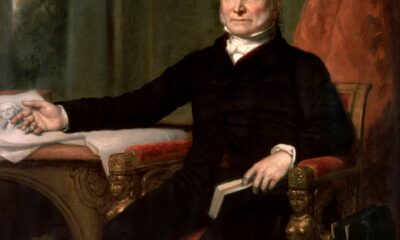Ignite the Pulpit
Jacob Emden on Christianity

Rabbi Emden(1697–1776) was one of the leading Torah authorities of the past several centuries. Historians of the rabbinate have often compared. him to Maimonides, both having written on all branches of Jewish knowledge, and both having shared a pragmatic and even innovative approach. Even those who disagreed with him sought his opinion, and he is read with interest to this day. Thus, Moses Mendelssohn, founder of the Haskalah (Enlightenment) movement, wrote to him as “your disciple, who thirsts for your words.” Although Emden did not approve of the Hasidic movement–which had its beginnings in his time–his books are highly regarded amongst Hasidim. R. M. Sofer referred to him as a “prophet” (Halam Sofer 6:59). Thirty-one works were published during his lifetime, ten posthumously while others remain in manuscript. In his time, he was a fearless champion of Orthodox Judaism.
This letter appeared originally in the Journal of Ecumenical Studies, 19:1, Winter 1982. One can inquire here for a reprint.
Rabbi Jacob Emden’s letter on Christianity
(SEDER OLAM RABBAH VEZUTA)
For it is recognized that also the Nazarene and his disciples, especially Paul, warned concerning the Torah of the Israelites, to which all the circumcised are tied. And if they are truly Christians, they will observe their faith with truth, and not allow within their boundary this new unfit Messiah Shabbetai Zevi* who came to destroy the earth.
*(Shabbetai Zevi, a seventeenth-century mystic [d. 1676], represented himself as the Messiah, and many Jews initially believed his claim. When the Turks threatened him with death unless he converted to Islam, he meekly acquiesced, expiring in ignominy. However, secret cells of believers still followed his teachings and hoped for new leadership.)
But truly even according to the writers of the Gospels, a Jew is not permitted to leave his Torah, for Paul wrote in his letter to the Galatians (Gal. 5) “I, Paul, say to you that if you receive circumcision, the Messiah will do you no good at all. You can take it from me that every man who receives circumcision is under obligation to keep the entire Torah.” Again because of this he admonished in a letter to the Corinthians (1 Cor. 7) that the circumcised should not remove the marks of circumcision, nor should the uncircumcised circumcise themselves.
Many have asked that Paul appears to contradict himself here. In the Acts of the Apostles (Acts 16), it is mentioned that Paul circumcised his disciple Timothy. And they found this very puzzling, for this act seems to contradict the later text which seems to indicate that he considered circumcision a temporary commandment until the Messiah’s arrival; but this took place after the time of the Nazarene! Therefore you must realize–and accept the truth from him who speaks it– that we see clearly here that the Nazarene and his Apostles did not wish to destroy the Torah from Israel, God forbid; for it is written so in Matthew (Mt. 5), the Nazarene having said, “Do not suppose that I have come to abolish the Torah. I did not come to abolish, but to fulfill. I tell you this: So long as heaven and earth endure, not a letter, not a stroke, will disappear from the Torah until it is achieved. If any man therefore sets aside even the least of the Torah’s demands, and teaches others to do the same, he will have the lowest place in the Kingdom of Heaven, whereas anyone who keeps the Torah, and teaches others so, will stand high in the Kingdom of Heaven.” This is also recorded in Luke (Lk. 16). It is therefore exceedingly clear that the Nazarene never dreamed of destroying the Torah.
We similarly find Paul, his disciple, in a letter to the Corinthians (1 Cor. 5), accusing them of fornication, and condemning one who had lived with his fathers wife. You may therefore understand that Paul does not contradict himself because of his circumcision of Timothy, for the latter was the son of a Jewish mother and a Gentile father (Acts 16), and Paul was a scholar, an attendant of Rabban Gamaliel the Elder, well-versed in the laws of the Torah. He knew that the child of a Jewish mother is considered a full Jew, even if the father should be a Gentile, as is written in the Talmud and Codes. He therefore acted entirely in accordance with the Halakha by circumcising Timothy. This would be in line with his position that all should remain within their own faith (1 Cor. 7). Timothy, born of a Jewish mother, had the law of a Jew, and had to be circumcised, just as he was enjoined to observe all commandments of the Torah (Paul’s condemnation of the man who lived with his stepmother is similarly understandable, as such an act is also forbidden to Noahides), for all who are circumcised are bound by all the commandments. This provides a satisfactory reply to the question.
This will also solve the apparent contradictions in the Nazarenes own statements. Christian scholars have assumed from certain passages in the Gospels that he wished to give a new Torah to take the place of the Torah of Moses. How could he then have said explicitly that he comes only to fulfill it? But it is as I have said earlier–that the writers of the Gospels never meant to say that the Nazarene came to abolish Judaism, but only that he came to establish a religion for the Gentiles from that time onward. Nor was it new, but actually ancient; they being the Seven Commandments of the Sons of Noah, which were forgotten. The Apostles of the Nazarene then established them anew. However, those born as Jews, or circumcised as converts to Judaism (Ex. 12:49; one law shall be to him that is home-born, and unto the stranger) are obligated to observe all commandments of the Torah without exception.
But for the Gentiles he reserved the Seven Commandments which they have always been obligated to fulfill. It is for that reason that they were forbidden pollutions of idols, fornication, blood, and things strangled (Acts 15). They also forbade them circumcision and the Sabbath. All of this was in accord with the law and custom of our Torah, as expounded by our Sages, the true transmitters from Moses at Sinai. It was they who sat upon his seat (as the Nazarene himself attested [Mt. 23]). It was they (the Sages or Pharisees) who said that it is forbidden to circumcise a Gentile who does not accept upon himself the yoke of (all) the commandments. The Sages likewise said that the Gentile is enjoined not (fully) to observe the Sabbath. The Apostles of the Nazarene therefore chose for those Gentiles who do not enter the Jewish faith that instead of circumcision they should practice immersion (for truly immersion is also a condition of full conversion), and a commemoration of the Sabbath was made for them on Sunday. — But the Nazarene and his Apostles observed the Sabbath and circumcision as mentioned earlier, for they were born as Jews. They observed the Torah fully, until after a period of time a few of them decided to give up the Torah among themselves completely. They said that its observance was too difficult for them and agreed to remove its yoke from their necks (Acts 15).
But even here they did correctly as far as the Gentiles were concerned, for they were not commanded to observe it. Nor is it proper to make it difficult for them, since they did not receive (accept?) the Torah and are not enjoined to ob serve the 613 commandments. However, it is completely different as far as the Jews are concerned, for they became obligated to fulfill the Torah because God delivered them from the iron furnace (Egypt) to be the people of his possession. Therefore they and their children became subject to it forever. This, their covenant, will not be forgotten from their mouths, nor be discontinued from their children. For it they have given their lives throughout the generations, as the Psalmist has recorded (Ps. 44:18): All this is come upon us; yet have we not forgotten Thee, neither have we been false to Thy covenant.
Certainly, therefore, there is no doubt that one who seeks truth will agree with our thesis, that the Nazarene and his Apostles never meant to abolish the Torah of Moses from one who was born a Jew. Likewise did Paul write in his letter to the Corinthians (1 Cor. 7) that each should adhere to the faith in which each was called. They therefore acted in accordance with the Torah by forbidding circumcision to Gentiles, according to the Halakha, as it is forbidden to one who does not accept the yoke of the commandments. They knew that it would be too difficult for the Gentiles to observe the Torah of Moses. They therefore forbade them to circumcise, and it would suffice that they observe the Seven Noahide Commandments, as commanded upon them through the Halakha from Moses at Sinai.
It is therefore a habitual saying of mine (not as a hypocritical flatterer, God forbid, for I am of the faithful believers of Israel, and I know well that the remnant of Israel will not speak falsehood, nor will their mouths contain a deceitful tongue) that the Nazarene brought about a double kindness in the world. On the one hand, he strengthened the Torah of Moses majestically, as mentioned earlier, and not one of our Sages spoke out more emphatically concerning the immutability of the Torah. And on the other hand, he did much good for the Gentiles (provided they do not turn about his intent as they please, as some foolish ones have done because they did not fully understand the intent of the authors of the Gospels. I have recently seen someone publish a book, and he had no idea about what he was writing. For if he had understood the subject, he would have kept his silence and not wasted the paper and ink. There are also found among us foolish scholars who know not their right from their left in the Written and Oral Torah and cause the people to err with their pompous pronouncements. But there are true scholars among the Christians, just as there are the chosen few among Torah scholars; and there are few of the truly great.) by doing away with idolatry and removing the images from their midst. He obligated them with the Seven Commandments so that they should not be as the beasts of the field. He also bestowed upon them ethical ways, and in this respect he was much more stringent with them than the Torah of Moses, as is well-known. This in itself was most proper, as it is the correct way to acquire ethical practices, as the philosopher (Maimonides) mentioned. We have written similarly in our Siddur. However, it is not necessary to impose upon Jews such extreme ethical practices, since they have been obligated to the yoke of Torah, which weakens the strength of the (evil) inclination without it. They have taken the oath at Sinai and are already trained in proper practice and nature. These are clear words that will not be rejected by a clear-thinking person.
If certain Christians who consider themselves scholars would understand this secret, who believe that they are commanded to abolish the Torah of Moses from the seed of Israel, they would not engage in such foolishness. The people listen to their self-conceived words, something which was never intended by the writers of the Gospels. Quite the opposite, they have written clearly that they intended the contrary.
Because of these errant scholars, hatred has increased toward the Jews who are blameless of any guilt and proceed innocently to observe their Torah with all their heart, imbued with the fear of God. They should instead bring their people to love the ancient Children of Israel who remain loyal to their God, as indeed commanded to Christians by their original teachers.
They even said to love ones enemies. How much more so to us! In the name of heaven, we are your brothers! One God has created us all. Why should they abuse us because we are joined to the commandments of God, to which we are tied with the ropes of his love? We do this not to enjoy the pleasures of the (evil) inclination and emptiness of a passing world. For truly (Ps. 44) we have become a byword among the nations, and with all this (ibid.). In God have we gloried all the day, and we will give thanks unto Thy name for ever. We pray for the good of the entire world, and especially for the benefit of these lands in which we reside, protecting us and our observance of the Torah…
You, members of the Christian faith, how good and pleasant it might be if you will observe that which was commanded to you by your first teachers; how wonderful is your share if you will assist the Jews in the observance of their Torah. You will truly receive reward as if you had fulfilled it yourselves-for the one who helps others to observe is greater than one who observes but does not help others to do so–even though you only observe the Seven Commandments. I have written similarly in my pleasant work Torat Ha-Kenaot– that the Jew who observes the Torah, but doesnt support it, is considered among the cursed; and the Gentile who does not observe the 613 commandments, but supports it, is considered among the blessed.
Translated by Harvey Falk
The above is part of Chapter 1 of Jesus the Pharisee, A New Look at the Jewishness of Jesus, by Harvey Falk, 1985
-

 Accountability2 days ago
Accountability2 days agoWaste of the Day: Principal Bought Lobster with School Funds
-

 Constitution2 days ago
Constitution2 days agoTrump, Canada, and the Constitutional Problem Beneath the Bridge
-

 Executive1 day ago
Executive1 day agoHow Relaxed COVID-Era Rules Fueled Minnesota’s Biggest Scam
-

 Civilization1 day ago
Civilization1 day agoThe End of Purple States and Competitive Districts
-

 Civilization5 days ago
Civilization5 days agoThe devil is in the details
-

 Executive4 days ago
Executive4 days agoTwo New Books Bash Covid Failures
-

 Civilization4 days ago
Civilization4 days agoThe Conundrum of President Donald J. Trump
-

 Executive14 hours ago
Executive14 hours agoWaste of the Day: Can You Hear Me Now?















Johnny Helbo liked this on Facebook.
[…] Jacob Emden on Christianity […]
[…] Jacob Emden on Christianity […]